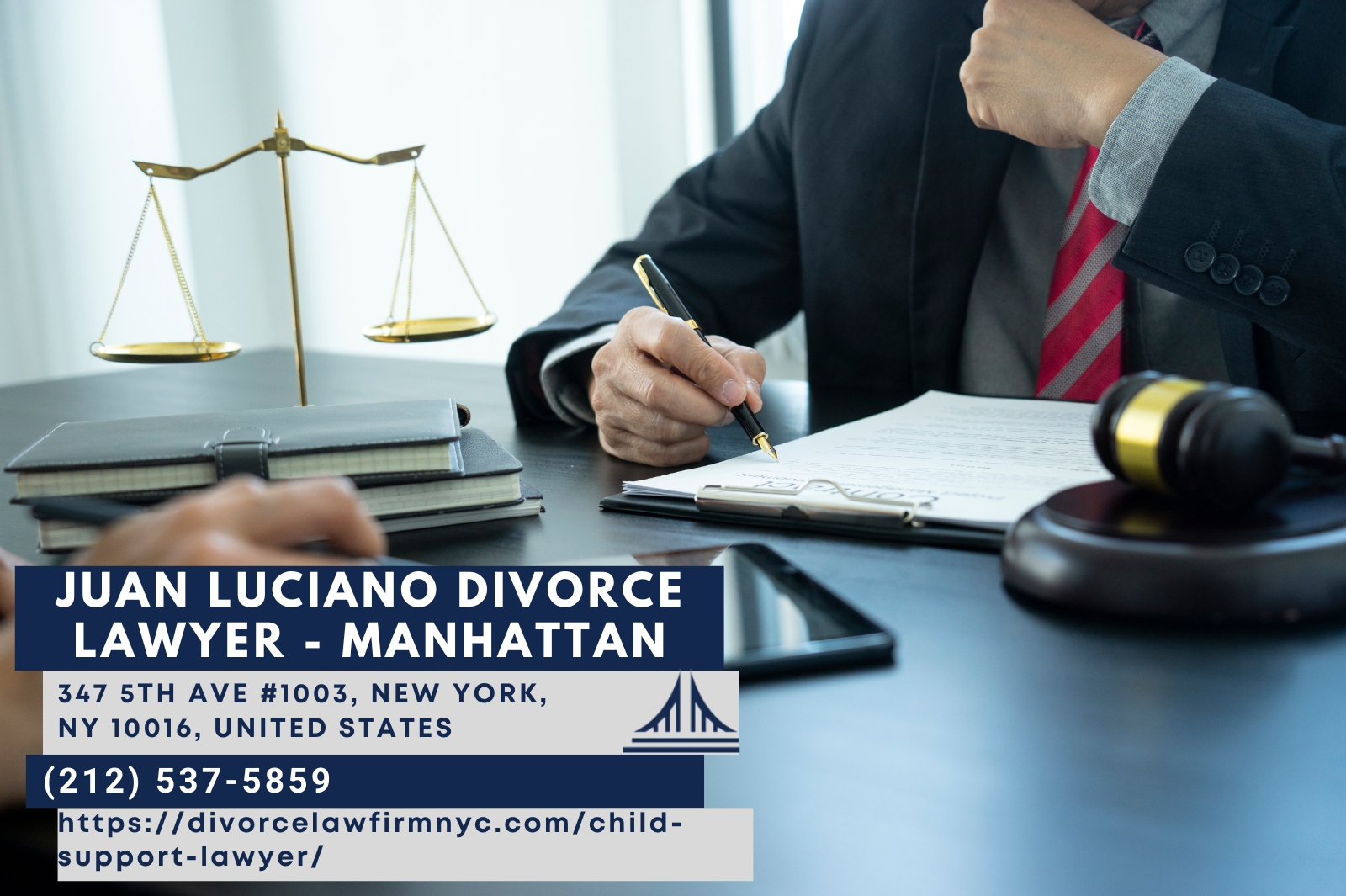New York child support lawyer Juan Luciano of Juan Luciano Divorce Lawyer has published an in-depth article shedding light on the nuances of child support laws in New York. The article serves as a comprehensive guide for parents handling child support matters, addressing important questions about how payments are calculated, enforced, and modified under New York State law.
According to the New York child support lawyer, child support obligations are determined based on the parents’ custody arrangement and income. The article explains that parents in New York are legally required to support their children until they reach the age of 21 or become emancipated. In cases of divorce or separation, financial support is formalized through a court-ordered child support agreement.
The article by the New York child support lawyer outlines the state’s income shares model, which is used to calculate child support payments. This model is designed to ensure that children receive a proportionate share of their parents’ combined income, reflecting the financial support they would have received if the parents had remained together.
“The goal of child support is to create some financial continuity for the child despite the separation of the parents,” says Luciano. The article provides a breakdown of percentages applied to combined gross income based on the number of children, ranging from 17% for one child to no less than 35% for five or more children.
The article delves into how child support is calculated and enforced. It emphasizes that the non-custodial parent is typically required to make payments to the custodial parent. These payments are used to cover the child’s basic needs and, in some cases, additional expenses such as health insurance, childcare costs, and educational fees.
However, when a non-custodial parent fails to meet their child support obligations, enforcement measures may be taken. Luciano explains that enforcement can include wage garnishment, property seizure, loss of licenses, interception of tax refunds, and other legal actions. “Enforcement is a necessary step to protect the rights of the child,” Luciano notes. “The court has tools to compel compliance, ensuring that the child’s financial needs are met.”
Child support arrangements are not static and may need to be adjusted over time due to changes in circumstances. Juan Luciano’s article highlights the situations in which a parent can petition for a modification of a child support order. These include substantial changes in income, the passage of three years since the last order, or a 15% or greater change in parental income.
“Life circumstances evolve, and child support orders must sometimes evolve with them,” Luciano explains. “The court takes a close look at these changes to determine whether a modification is warranted to better reflect the child’s current needs and the parents’ financial realities.”
The article also examines the nuances of complex child support cases, including those involving high-net-worth individuals and interstate child support issues. High-net-worth cases often require a detailed analysis of both parents’ financial situations to maintain the child’s standard of living. Similarly, interstate cases, where one parent relocates out of New York, require addressing additional legal considerations under the Uniform Child Custody Jurisdiction and Enforcement Act.
Luciano stresses the importance of legal guidance in such situations. “Complex cases demand a thoughtful approach that balances financial responsibility with the unique needs of the child,” he says. “Parents should work with a knowledgeable attorney to protect their rights and the interests of their child.”
Beyond basic child support obligations, the article discusses mandatory add-on expenses such as health insurance, unreimbursed medical costs, and childcare expenses. These costs are typically shared between both parents. The court may also consider non-mandatory expenses, such as private school tuition or extracurricular activities, depending on the child’s needs and the parents’ financial ability.
Luciano emphasizes that understanding these additional obligations is crucial. “Many parents are unaware of the full scope of their responsibilities under a child support order,” he explains. “By addressing these add-ons early, parents can avoid disputes and ensure that their child receives the support they require.”
For parents facing child support issues in New York, seeking legal guidance can make a significant difference. Juan Luciano’s article encourages parents to educate themselves about their rights and responsibilities while working toward solutions that prioritize their child’s well-being.
About Juan Luciano Divorce Lawyer:
Juan Luciano Divorce Lawyer is dedicated to helping families manage the challenges of divorce and child support in New York. With years of experience in family law, the firm provides compassionate and results-driven representation to parents seeking fair resolutions for their children’s financial futures. Juan Luciano and his team focus on achieving equitable outcomes that support the well-being of children and families during difficult times.
Embeds:
Youtube Video: https://www.youtube.com/watch?v=RAOACqunfY8
GMB: https://www.google.com/maps?cid=4020903599192949720
Email and website
Email: juan@divorcelawfirmnyc.com
Website: https://divorcelawfirmnyc.com/
Media Contact
Company Name: Juan Luciano Divorce Lawyer
Contact Person: Juan Luciano
Email: Send Email
Phone: (212) 537-5859
Address:347 5th Ave #1003
City: New York
State: New York 10016
Country: United States
Website: https://divorcelawfirmnyc.com/

